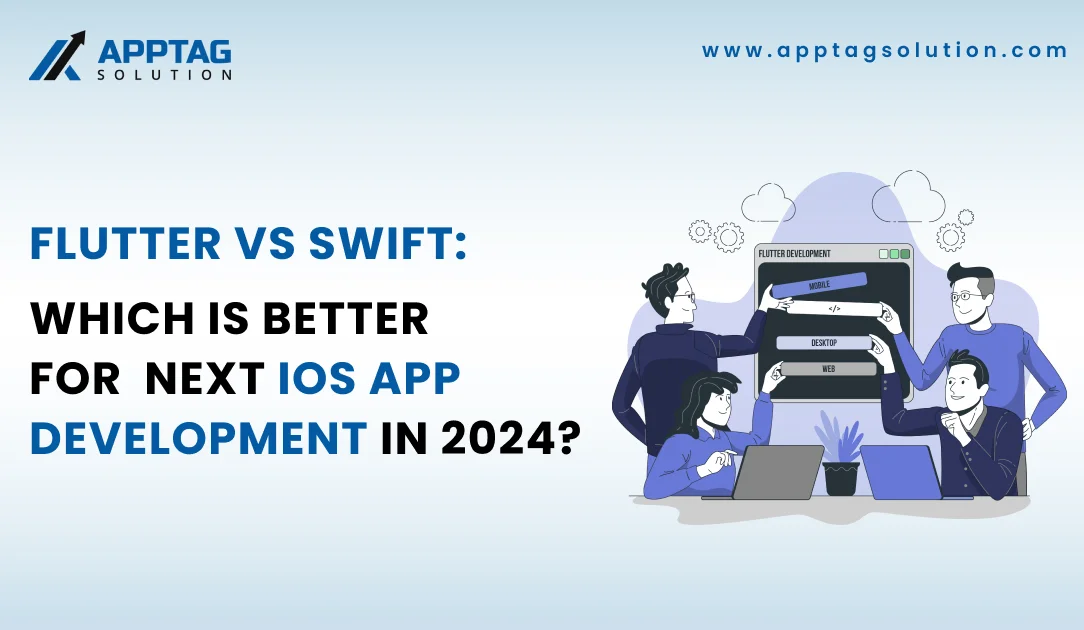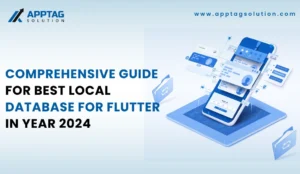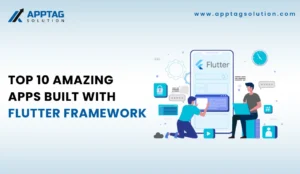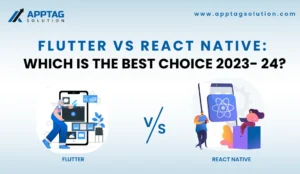It has become a hot topic for debate among app developers in 2024. Due to the evolving ecosystem of the Apple company, there is a Greater demand for iOS app development. But there is a dilemma among the developers: Swift vs Flutter. Which one to choose?
This blog post covers the detailed comparison between these two technological stacks Flutter vs Swift. This helps you to decide the right application for your next unique iOS development project. Continue reading to find more:
Introduction
Do you know the most commonly used technologies that create iOS applications? The answer is Flutter & Swift. Flutter is considered an open-source UI development kit. It is developed by Google. This Framework facilitates cross-platform app development using a single code base. Whereas Swift is high-level & general purpose. As it comprises the multi-paradigm. While being a compiled programming language.
Flutter vs Swift: Why to compare?
The mobile application market is expected to grow to $ 56 trillion by 2027. and therefore significant growth is projected in the coming days. Since there is growth in the mobile app market, the iOS app market follows the same trajectory. But there is a hustle among developers to choose between Swift vs Flutter. This is as per their unique requirements. Although the two frameworks are quite efficient.
And also cater to the unique needs of the business. But there are some aspects that make them different from each other. And this is where the App developers can draw the benefit. Let’s take a look.
Swift vs Flutter: overview of Swift
Swift acts as a high-level language. And it has been brought forward by the open-source community. This is in collaboration with the Apple company. It is a multi-paradigm and is a general-purpose language. Swift is working with both Cocoa and Cocoa Touch frameworks.
Swift vs Flutter: advantages & limitations of Swift
| Pros of Swift | Cons of Swift |
| The Swift utilizes LLVM compiler Technology. And thus, there is the possibility to gain access to standard libraries. As it makes writing code fast and efficient. | Although Swift has been in the market for quite a while. But it is not as mature as # C or C++. And this means that it lacks some robust programming requirements. |
| also Swift is modern code. And comprises inferred categories of language. As it is convenient to maintain. And also there are fewer errors. | Swift offers cross platform support. however it is not as strong as other frameworks. it provides support to Apple devices.
the programming language get updated on a frequent basis. it becomes hard to find right tools for creating iOS apps.
|
| Swift is associated with automated memory management. Also, there are auto code checks. As this ensures a high level of security. | The developer may not be able to utilize the XCode framework. This is in order to create Swift based IOS applications.
|
| The libraries of Swift that assesses the specific code get integrated into the device. And this is as quickly as the release of the app version takes place. | Swift is unstable. It has raised concerns. as there is lack of backward compatibility. This is with each and every new release. |
| Swift access open source programming language. And this literally translates into extensive community support. Thus, there is a consistent revival of the programming language. And this makes it capable of offering more features. | although the swift community is growing fast. However, it is smaller. This is in comparison to other open source languages. |
Flutter vs Swift: What is flutter?
The flutter acts as an open source UI framework. And this is created by the Google company. And it helps to develop native applications through a single code base. So, developers can deliver multiple platform apps and make a single code base.
advantages and limitations of flutter
| Pros of Flutter | Cons of Flutter |
| The flutter speeds of the development process. As there is no requirement of too many teams that work on multiple platforms. The flutter makes
feature/ functionality changes within a live environment. and that too with hot reload.
|
The flutter still exists in the nascent stage. However, this language version gets updated. This is one of the reasons that developers won’t be able to introduce many features immediately. |
| There is layered architecture in flutter. And thus, developers acquire complete control. this is over the pixels. And thus, it imparts customization as well as rendering. | The iOS Android version updates gets delayed on this framework
you may not acquire the exact look as well as feel of native mobile application.
|
| there is availability of complete documentation in flutter. So, this helps to understand the next move. And also facilitates smooth development by app developers. | There are no set specific guidelines. This is for the design whenever it comes to iOS app development using flutter. |
| the widgets make sure there is a comment to create UI from scratch itself. This saves time and improves productivity. | |
| There is reusing of the single code base. This allows developers to create Apps for multiple platforms. And it saves their time as well as cost. | |
| The flutter facilitates convenient adaptability all across different screens.
|
Flutter vs Swift: Detailed comparison
Flutter vs Swift: learning curve comparison for iOS app development
The learning curve for Flutter is just like a piece of cake. This is true when you are familiar with the object-oriented programming language. This may include Kotlin or even Java. Also, there are helpful tutorials with easy-to-read documentation to learn flutter.
On the other hand, the swift learning curve is challenging. It might be tough for the programmers. Especially the ones who are not familiar with functional programming. Or how to develop iOS applications.
Conclusion
Concerning the learning curve, you cannot decide between Swift vs Flutter: Which one is easy to learn? As the app development depends upon Intelligence and the programmer’s overall knowledge.
Swift vs Flutter: performance parameter
The Flutter application runs a natively built code. And thus, they are devoid of interpreter influence. And can provide native-level performance. This is across multiple platforms. The Flutter applications get compiled into native ARM code. And can run on the CPUs of devices directly.
The flutter performance is generally good. However, there can be some overhead. This is based on how Dart as well as the UI rendering of Flutter is working.
Swift facilitates developers to write optimized code for iOS devices. This is for the tasks that require a high level of computational work.
Swift facilitates the professional to create highly optimized code. This is for the Apple devices. And gives a chance to leverage upon full power of the platform.
Conclusion
If the budget is not your constraint and you want a separate application for every platform, then Swift can be the right solution. Flutter is a good choice for cross-platform flexibility and cost efficiency.
Flutter vs Swift: accessibility
The Swift by default comprises accessibility features within the UI Kit framework. However, developers can use UI accessibility protocol. But they must enter appropriate accessibility information. This is for every UI element.
The flutter does not comprise inbuilt accessibility features. Also, the documentation suggests that there is a chance to audit iOS applications. But this is through the use of Xcode’s accessibility inspector tool.
Conclusion
Swift has an edge over the Flutter framework whenever it comes to accessibility features.
Swift vs flutter: Stability criteria
Both Swift and Flutter are young in the marketplace. Both are stable. And also secure at the same time. The flutter comprises exceptional stability. And also reliability. There are automated testing tools. They can detect as well as resolve bugs. This is before it impacts users.
Conclusion
The Swift tends to be safe and reliable. However, flutter has exceptional reliability and safety features.
Flutter Vs Swift: Application size & complexity
The app size of the swift is around 25 MB. A flutter generated application consists of a file size of 52.4 MB. The flutter applications are larger. Both types of applications function flawlessly in terms of complexity. The iPhone app user can tell you the exact difference.
Conclusion
The flutter applications tend to have larger sizes. Swift is native. And can result in applications of smaller sizes. The flutter simplifies the cross-platform development process. This potentially reduces complexity.
Swift vs Flutter: Testing & documentation feature
The Flutter developers emphasize widget testing. And also on integration testing. This helps in UI testing across platforms. The flutter documentation is extensive.
The swift comprises XCTest. As it imparts a robust unit. And also UI testing for the ecosystem of Apple.
The official documentation of Apple is quite comprehensive. As it imparts detailed guidance on language features. Also upon the frameworks and best-in-class practices.
Conclusion
Both platforms emphasise testing. The flutter has the advantage of a single code base. This simplifies cross-platform testing. Swift has integration with the Apple ecosystem. This facilitates deep integration testing.
Flutter vs Swift: user interface feature
Flutter and Swift have different approaches. This is in terms of user interface. The flutter employs a widget-based approach. This facilitates high customization. And also consistent UIs across multiple platforms.
The Swift comprises a declarative UI design paradigm. And simplifies the building of dynamics. And also interactive interfaces for the Apple ecosystem.
Conclusion
Swift vs Flutter, your choice is dependent upon platform targets. And whether you intend to prioritize cross-platform development. Or you are looking for a seamless UI experience tailored for Apple devices.
Swift vs flutter: iOS app development time
The iOS app development is faster using Flutter. It is because of the abundant widgets & libraries. Also, flutter provides extensive navigational aids and testing tools. The hot reload feature reduces the number of recent code changes.
Swift is best language to develop IOS apps from scratch. The swift functions well. However, it takes longer to make changes to the code. And to bring in effect.
Conclusion
Flutter is a clear winner whenever it comes to the faster iOS app development time.
Swift vs flutter: development cost
The flutter facilitates developers to create cross-platform apps. Thus development cost goes down. If you use Swift, for native iOS app development, the cost tends to be higher. As you hire an iOS developer. These are native coders. And they charge more than Android developers.
Conclusion
The Flutter has cross-platform capabilities. This makes it cost-effective in comparison to the Swift framework.
Flutter vs Swift: app reloading feature
The hot reload feature of the app has turned out as an edge. The developer can witness changes instantly. This is without the need to restart the app. In Swift app development, code changes typically need recombination as well as app relaunch.
The Xcode is an integrated development environment from Apple. And impart features like hot swapping. Also, live preview for SwiftUI.
Conclusion
The flutter Framework hot reload feature provides a quicker development cycle. And this is in comparison to Swift’s recompilation. This imparts a competitive edge to flutter in terms of speed and efficiency.
Conclusion: flutter vs Swift- Which one is better?
When you decide between Flutter vs Swift for app development. Consider the factors listed above. There are many frameworks for iOS app development. But your choice depends upon understanding their unique features. When you compare Flutter vs Swift for iOS development, there is no sure-shot answer. So, consider the strengths. And also the framework of the trade-offs.
This guide assists you through the key features of Swift. For example, ease of syntax. And also automated memory management. In Flutter, there are hot reload & widget library features. And this helps in programming. You also learn about the pros and cons of the two frameworks.
The Swift is reliable in performance and security. However, flutter aces whenever it comes to creating the app with speed. And also the capability to accelerate time to market.
Hire our company App Tag Solutions for iOS App development!
Are you looking for iOS application development? If yes then, our company App Tag Solutions, is here to assist you in creating flutter apps. And also employs Swift developers who are proficient in creating the finest cross-platform applications. Hire dedicated Flutter developers who have successfully delivered stunning, high-performance, and scalable iOS web and mobile applications.
Set up your Offshore development team! Request a quote today!
Frequently Asked Questions(FAQs)
-
Flutter vs Swift: which is better?
Swift is a good choice when you want solutions for Apple devices. If you look for high-performing applications. And for multiple platforms and faster time to market. Then flutter is the ideal platform.
-
Is Dart convenient in comparison to Swift?
Swift is a mature language. as it imparts accessibility. And much better integration with its native components. The Dart is convenient to execute. This is with the help of the flutter framework. It delivers Android and IOS apps, simultaneously.
-
Swift vs Flutter: which one should I learn?
Do you want to build iOS applications? If yes, you should learn Swift. Otherwise, you can gain knowledge about Flutter if you are interested in cross-platform development. And you want to create applications for different platforms using a single codebase.
-
Is it possible to use Flutter for iOS application development?
Yes, it is. You can utilize Flutter to build applications for Apple devices. As it is intuitive and native with cross-platform functionality. Also, there is less development time & exceptional User experience.
-
Can I use both frameworks, Flutter, and Swift in combination?
Yes, you can conveniently use Flutter and Swift together in combination. This is to assess native iOS features. as well as the functionalities. The complex one is not present in a flutter. Also, you will be receiving exceptional features of both flutter and Swift in the end product.




